10 years of E tū
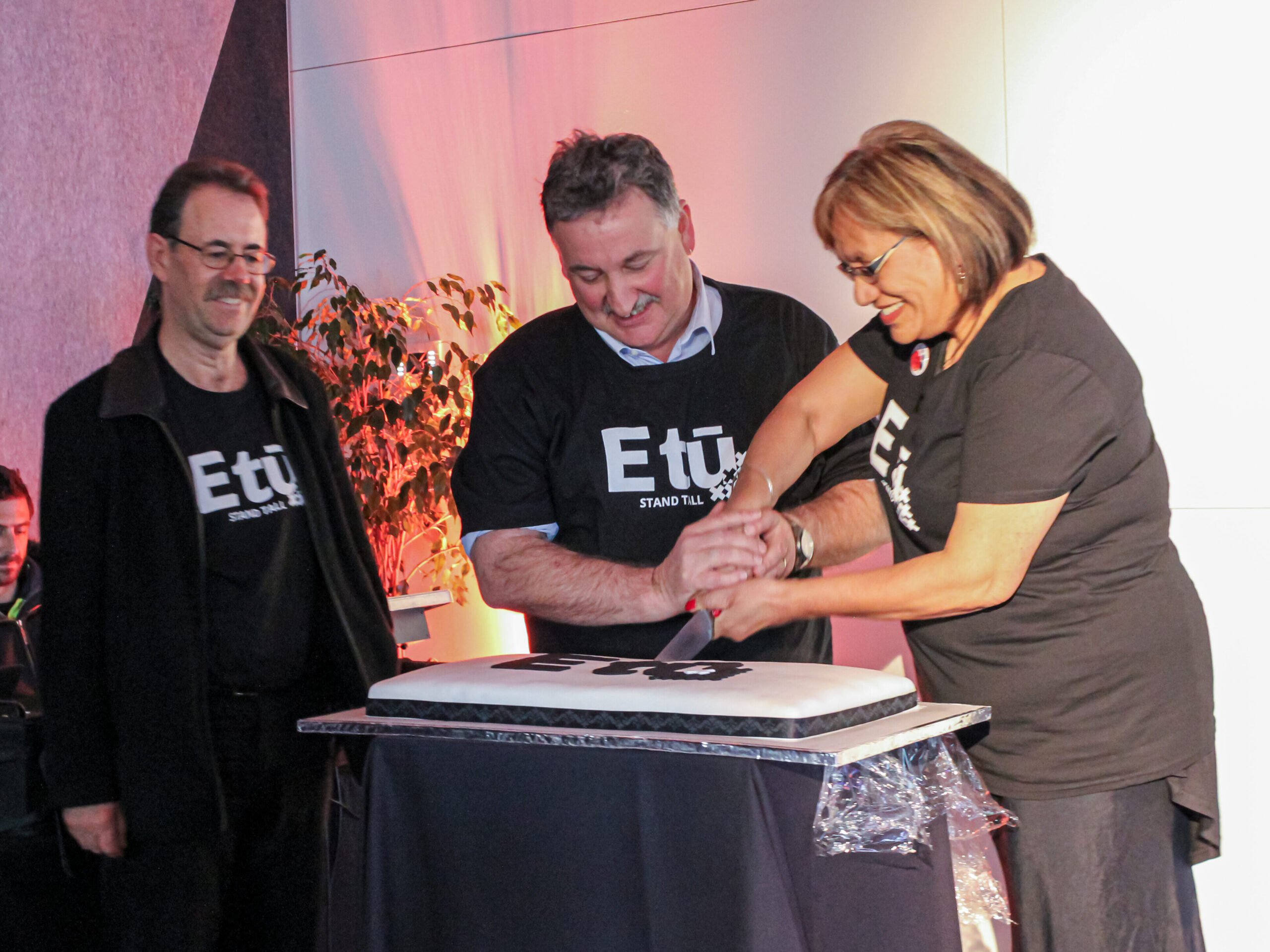
This October marks 10 years since our union came together – and what a decade it’s been!
E tū was officially launched at the Wharewaka in Wellington in October 2015, bringing together three legacy unions with a shared vision: empowering working people and our communities for a better life. Since then, we’ve celebrated major victories, faced tough battles, got through a global pandemic, and built real strength and power together.
To celebrate our 10th birthday, we’re running three competitions for members – and there’s a brand new Samsung A-Series mobile phone up for grabs in each!
- Best short video about unionism: Make a short video (about a minute long) that shows why unionism matters. Share your experiences, the wins, and what being in E tū means to you. The winning video will be published on our web platforms.
- Best 200-word story – Fight Back against the anti-union Government: Write a short piece about standing up together, showing resilience, and the power of collective action, in the face of the Government’s anti-worker attacks. Inspire others to join the fight. The winning story will be published on our web platforms.
- Best recruiter: Sign up the most new members over three weeks and take home the prize. Show others the benefits of being part of E tū and help grow our union.
Click here to make your entry using our online form.
All entries must be submitted by Monday 20 October 2025.
Your local vote is powerful – make it count!
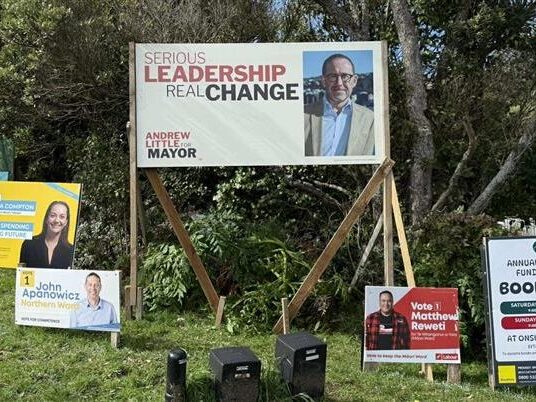
Local elections decide the stuff that shapes our daily lives: public transport, libraries, rubbish collection, housing, rates, whether councils back the Living Wage, and so much more. It’s where working people’s voices can make a real difference.
Your voting papers should have arrived in your mailbox by now. Fill them in and send them back by Tuesday 7 October so they arrive on time. If you miss that date, you can drop your papers in one of the orange ballot boxes at supermarkets, libraries, and other spots in your community. Do this by 12pm on Saturday 11 October for your vote to count.
If your papers still haven’t shown up, you’ll need to cast a special vote. Check the details for your area here: votelocal.co.nz
Every vote is a step towards councils that value decent work, strong services, and vibrant communities. Don’t sit this one out, make your voice heard.
Women’s Day of Action shows pay equity is far from done
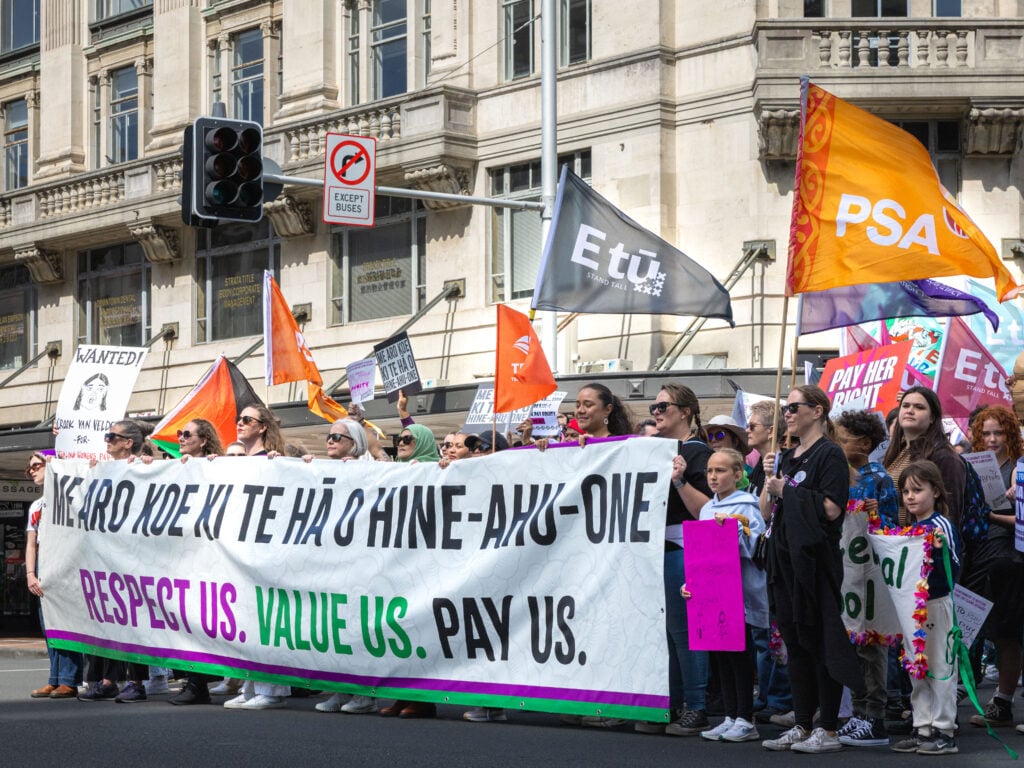
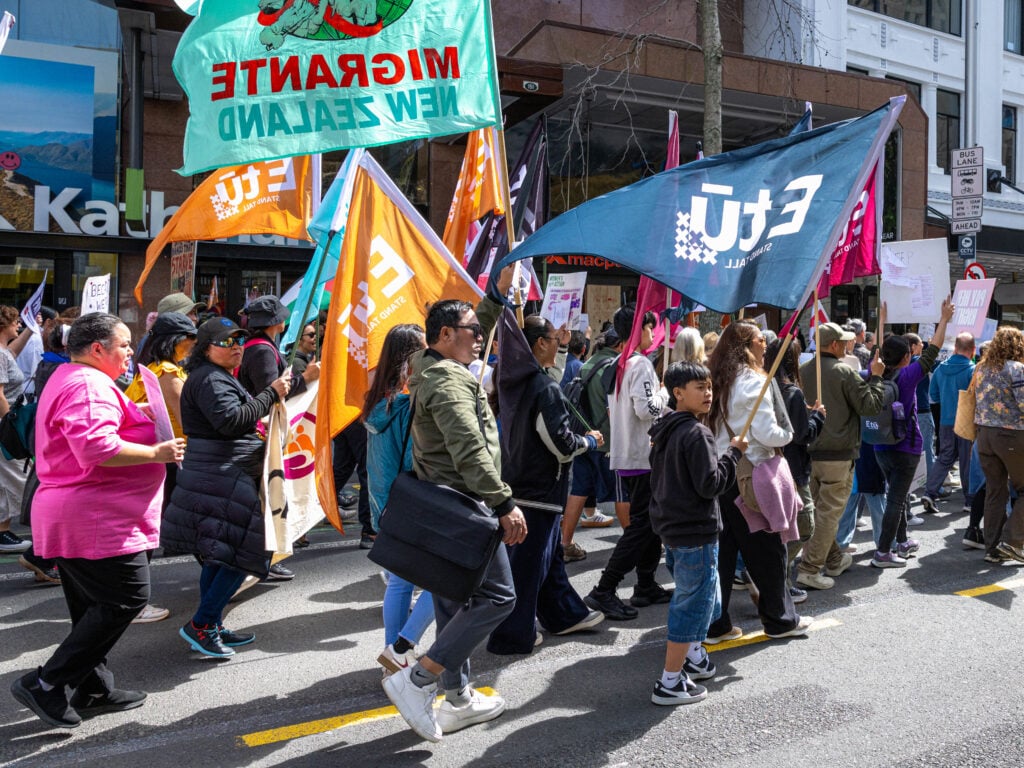
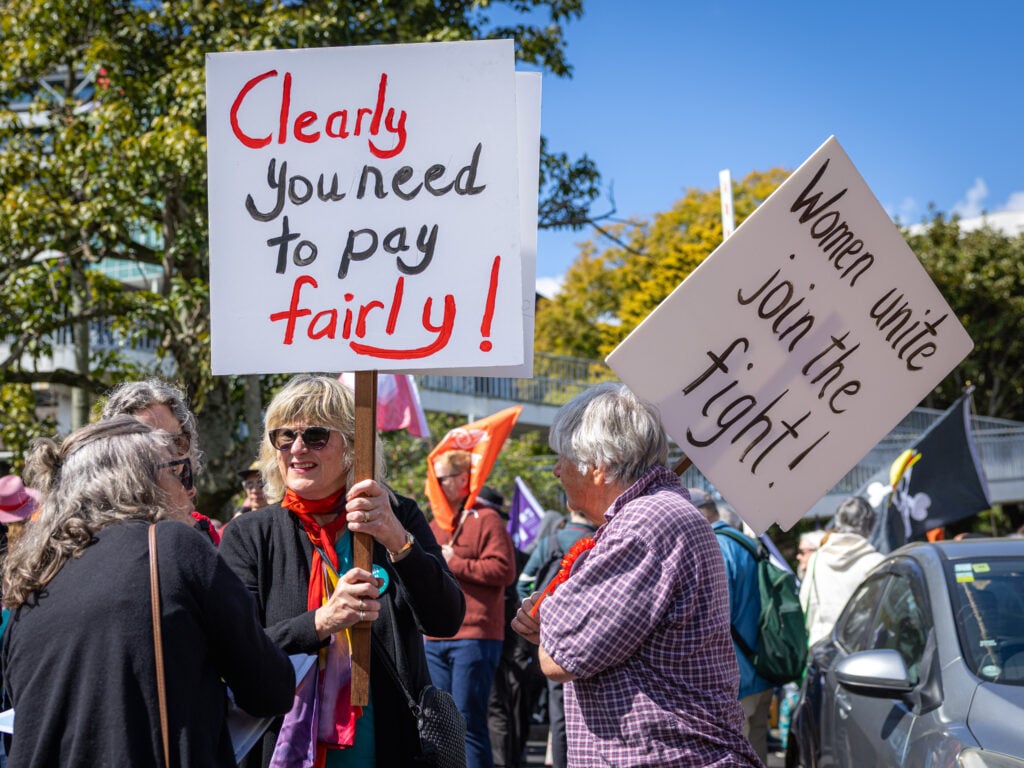
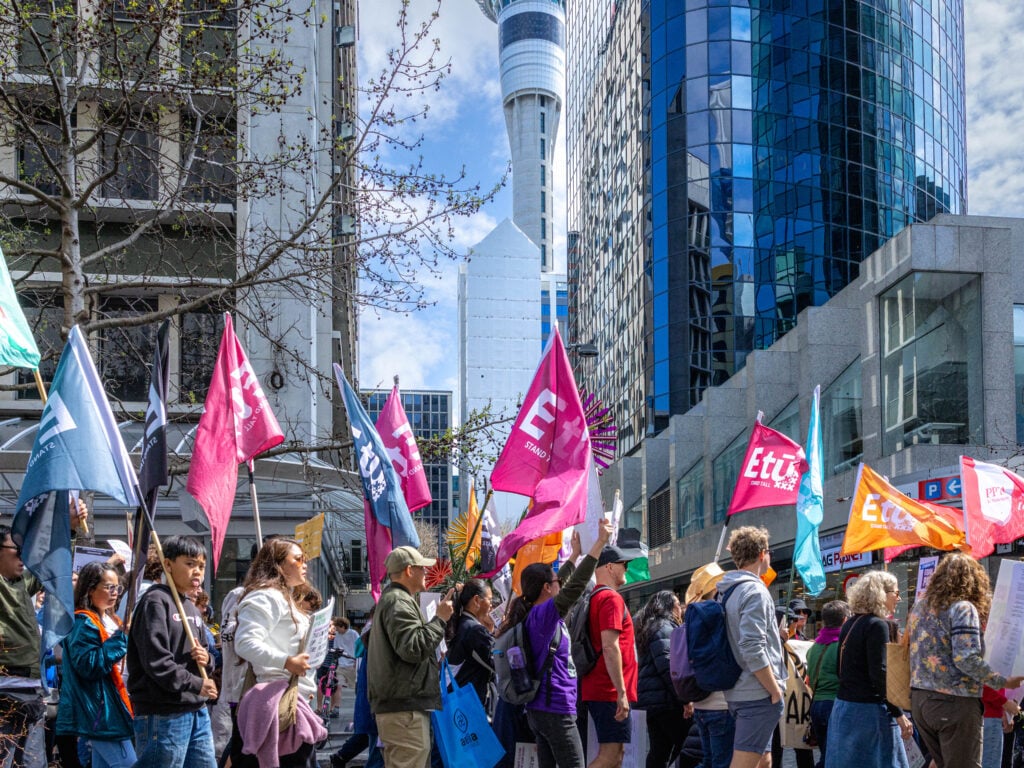
On Saturday 20 September, thousands of women and allies rallied across Aotearoa for the Women’s Day of Action, standing up for pay equity and marking 132 years since women first won the vote. The action was a response to the Government scrapping more than 180,000 workers’ pay equity claims, and making it very difficult to make new claims in future.
From Whangārei to Invercargill, more than 20 events brought people together with powerful speeches, performances, and plenty of signs demanding the Government stops their attacks on women and workers. The message was clear: pay equity is not negotiable, and women’s voices – and votes – are powerful tools for change.
Home support worker and Convenor of the Community Support Services Industry Council, Tamara Baddeley, was involved in her local event in Napier.
“The Women’s Day of Action was positive and empowering – but it’s a damn shame we still have to fight for what we deserve,” Tamara says.
“Whoever gets into Government next year needs to reinstate the pay equity claims as soon as possible, and sign them off as soon as possible, to start giving the women of New Zealand what we have fought so hard for.”
After our sustained campaign on this issue, the New Zealand Labour Party announced on this day that they will restore at least the $12.8 billion stolen by the current government from pay equity claims.
Delegate Becky Higham, who represented E tū at the New Plymouth action, composed this little ditty for the occasion:
Down through the ages, men ruled the roost,
But it’s time for pay equity to be introduced.
We’re tired of doing the same work for less,
Carrying the load without the success.
Women in action just want to be seen,
Valued and heard, and everything in between.
Respect us, value us, and pay us our worth,
We’re not the only ones working this earth.
Women in the workforce care about our jobs,
It’s a shame the powers that be are all such knobs.
Members get active at Biennial Membership Meetings 2025
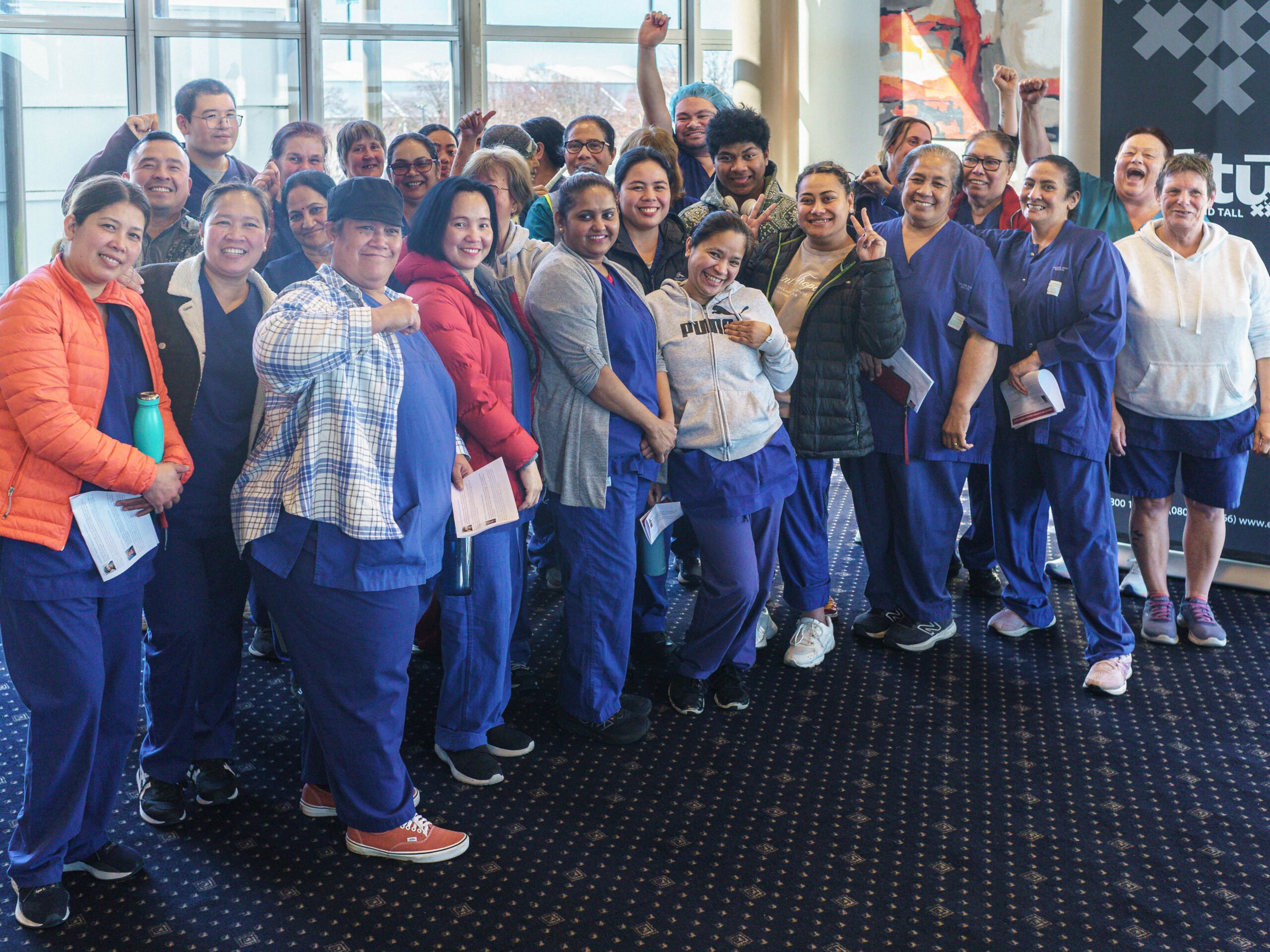
All E tū members were invited to our Biennial Membership Meetings (BMMs) held across the country over September. They were highly engaging events, with members focussed on understanding the pressures we are under, and making plans to fight back for decent work and better lives.
The BMMs are also part of our union’s democracy, giving members the opportunity to elect Regional Representatives and Vice-Presidents. There was an election held for the Southern Regional Representative at the southern BMMs, while other representatives were elected unopposed. Your representatives are:
North Island Vice-President: Mischelle Moriarty
South Island Vice-President: Don Pryde
Northern Regional Representative: Jason Fell
Central Regional Representative: Nia Bartley
Southern Regional Representative: Nikki Twine
These E tū activists help make up the member-led E tū National Executive, ensuring our union’s leadership reflects our diverse union in all decision making.
Living Wage lifts as the fight continues
On 1 September, the Living Wage rate rose to $28.95 an hour, a $1.15 increase that reflects the rising cost of living and the need for fair pay. That’s good news for workers at accredited Living Wage Employers, but there’s still plenty of work ahead.
Greater Wellington Regional Council has voted to become Living Wage accredited, joining other councils that are leading the way by ensuring contracted staff like cleaners, security, and transport workers are paid fairly.
Meanwhile, the Government is still threatening to cut the Living Wage from procurement rules, a move that would strip protections from thousands of low-paid workers who look after our public buildings and services.
And on the ground, E tū members are keeping up the fight at the bargaining table. At Resene, members are standing strong for Living Wage pay, backed by huge community support.
We’ll keep fighting in every workplace and every contract. The Living Wage isn’t just a number, it’s about fairness, dignity, and making sure all workers can live decent lives.
Industry Councils together for the first time
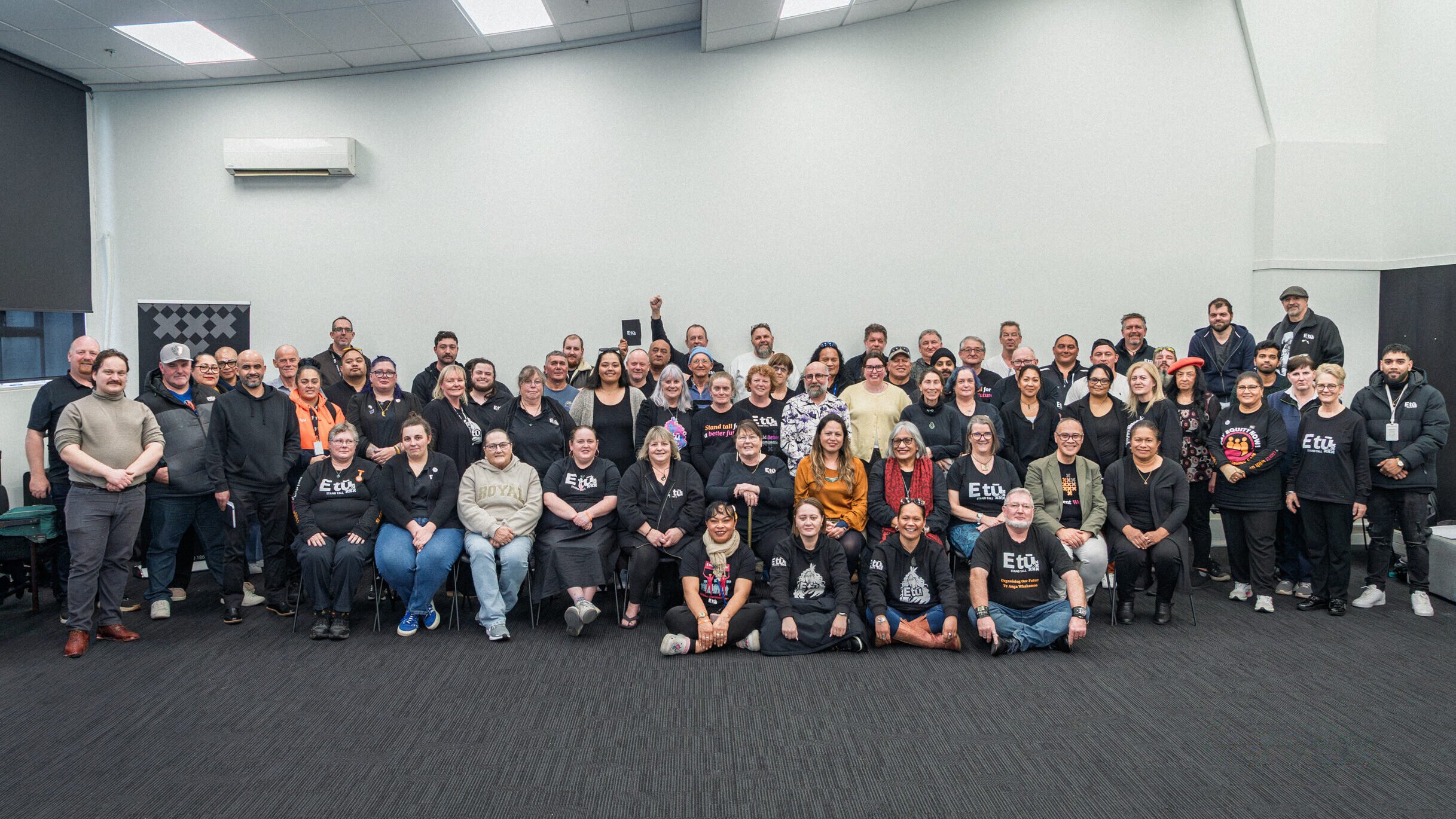
In August, E tū hosted our very first Combined Industry Council Forum – the first time all industry councils have come together under one roof. Jason Fell, E tū Northern Regional Representative, says the biggest impact came from members connecting across industries.
“What struck me most was the shared energy in the room,” Jason says.
“No matter what job we do, we all carry many of the same frustrations, challenges, and obstacles in our workplaces. To sit together, talk openly, and realise that we’re not alone in these struggles was both reassuring and inspiring.”
Workshops and guest speakers added to the energy, but it was the conversations between delegates that stood out most. The forum showed the strength of E tū members coming together to share experiences, find solutions, and build solidarity across the union.
Stuff workers strike for fairness
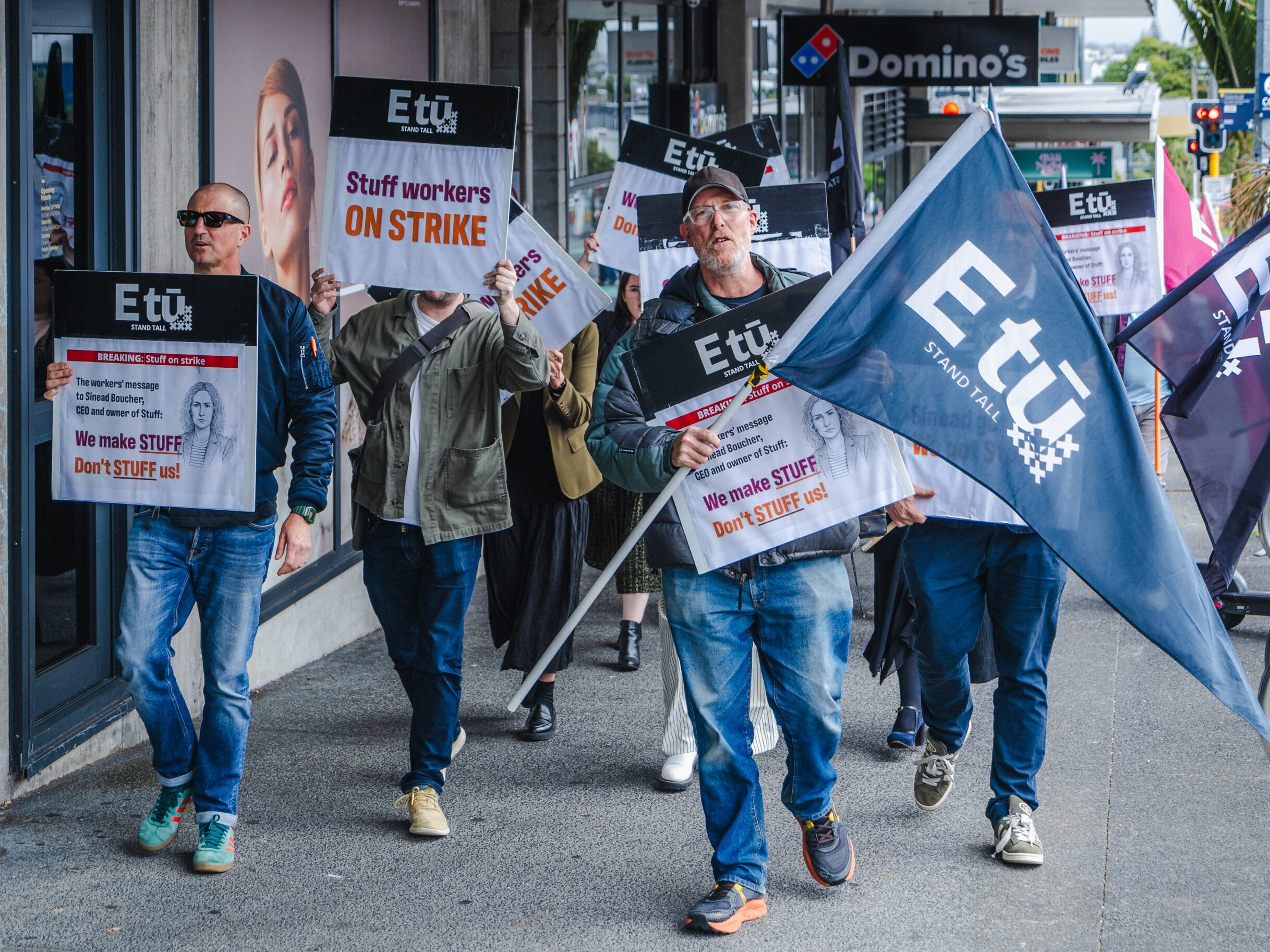
At the end of August, Stuff journalists and staff across the country took strike action over unfair pay offers and a plan to split their collective agreement in two. The company’s attempt to divide staff into separate agreements would weaken unity and bargaining power. On top of that, the pay offer is far from adequate, and doesn’t reflect the hard work of these members through very tough times.
Hundreds of union members joined pickets in Auckland, Wellington, Christchurch and Hamilton, showing the strength of their resolve. The message was clear: after years of hardship, Stuff workers deserve respect and proper pay.
Senior Stuff delegate Sapeer Mayron says solidarity is what mattered on the day.
“It’s rarely pleasant to go on strike. But if it must be done, at least it is among supportive colleagues and union comrades,” Sapeer says.
“When we took to the streets for fair pay across the Stuff Group, we looked after each other and encouraged each other, and that made the striking experience really positive, I think across the board. As union members we take the decision to strike seriously and certainly don’t rush towards it during bargaining, but when discussions break down and fair offers aren’t made, we felt we had little choice.
“We have a date set for mediation now and I am optimistic that Stuff will make the most of the opportunity and bring a fair pay offer to the table that we can confidently take back to members. I look forward to it.”
A decent settlement at NZME

After a tough year of job losses and uncertainty, NZME members have secured a decent new settlement that delivers a much-needed pay boost. Their first offer was subpar, but they were committed, pushed more, and won a $3,000 pay rise!
Delegate Dallas Smith says the win shows the power of members working together:
“I’m incredibly proud of the work done by the bargaining team, and the members who supported us, to achieve this outcome. As a new delegate, I found the support and engagement from our union cohort critical in reaching this deal, which will see a decent pay increase for our members in a time when it is sorely needed. It was encouraging to see a collective effort from our union group to reach a settlement that would focus primarily on uplifting our lowest paid members.”
Delegate Jaime Lyth says the result is especially meaningful given what staff have been through:
“It’s been a difficult year for NZME staff following a restructure which saw many staff made redundant, and anxiety around a proposed takeover of the company’s board. Following these circumstances, we are very pleased with the results of our bargaining, which highlights the value of the hard work that staff across NZME do.”
E tū members at NZME have shown that even in the hardest circumstances, standing together delivers results.
Nelson hit hard: Eves Valley and Sealord job cuts deepen crisis
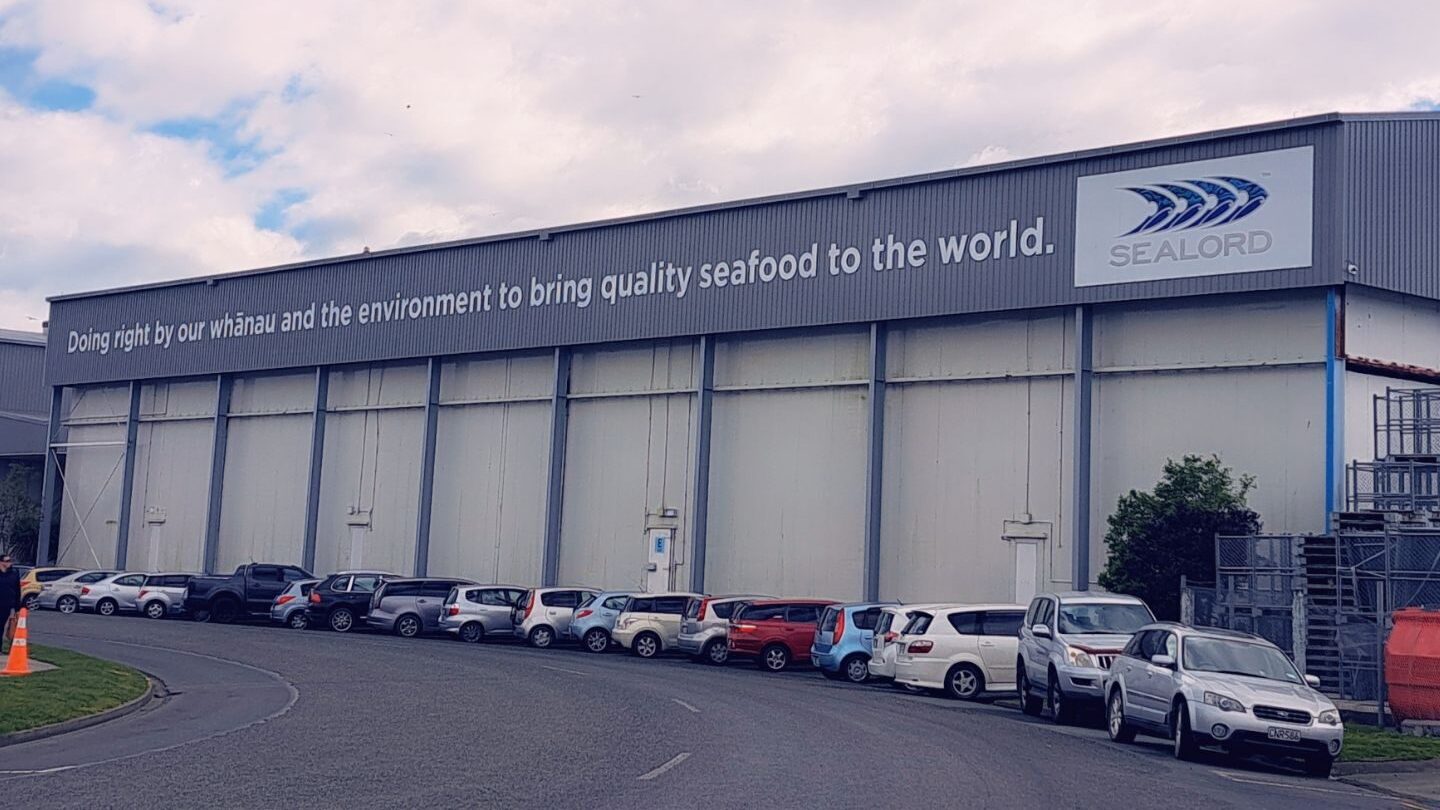
Nelson’s job market has taken a double hit. Eves Valley Sawmill confirmed it will shut this year, costing 142 workers their jobs. That closure is already sending shockwaves through the region.
E tū delegate Maria Hemara captured the emotion: “I’m feeling devastated, I feel like I’ve lost my whole family … It’s like going to your own funeral.” She says many are scrambling for work, trying supermarkets or temping, while the whole community feels the loss.
On top of that, Sealord is proposing further cuts in Nelson, and shifting operations to seasonal work rather than full-year. The company is seeking to retain some core functions, but it’s another blow to a region already reeling from closures.
These aren’t isolated events. When major employers pull the rug out, the ripple affects every business. People leave town. Families struggle. Communities shrink.
E tū will support every worker through this, with help finding alternative work through E tū Job Match, pushing for fair compensation, and demanding that regional and central government step in with real support for a Just Transition. These losses must not be written off.
Tokoroa plywood workers face closure plan
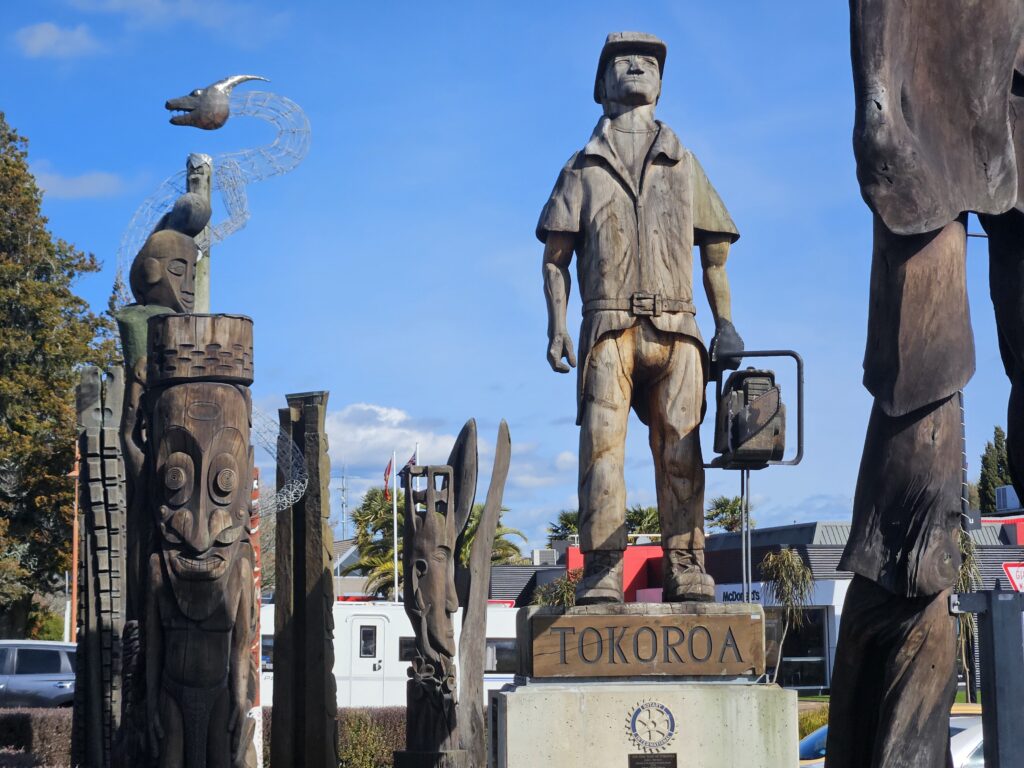
Tokoroa has been hit again, with Carter Holt Harvey announcing plans to shut its plywood factory, putting more than 100 jobs on the line. It follows the closure of the Kinleith paper machine earlier this year, which already cost about 150 jobs.
E tū delegate Andrew Dobbs, who has worked at CHH for 24 years, says the impact on workers and the town is enormous.
“It’s just really sad. We knew things were tough, but I didn’t expect them to stop manufacturing altogether. You’d say people are feeling sad and depressed – it’s not quite a closure, but there will be so few people left there, making nothing, just reprocessing imports to send to market. Basically, imported product is just too cheap for us to compete with, that’s the guts of it.”
Andrew says the community is running out of options.
“Personally I don’t want to move out of town, but that might be the only choice we’ve got. You already know that the pulp and paper mill has cut jobs, they’ve either moved out or are looking for jobs. Now there’s going to be a whole lot more people looking for jobs locally, but there aren’t that many jobs at present, not for that many people.”
These losses cut deep in a town built on pulp and timber. They also underline a bigger issue: without planning and investment, regional communities are left exposed when companies walk away.
